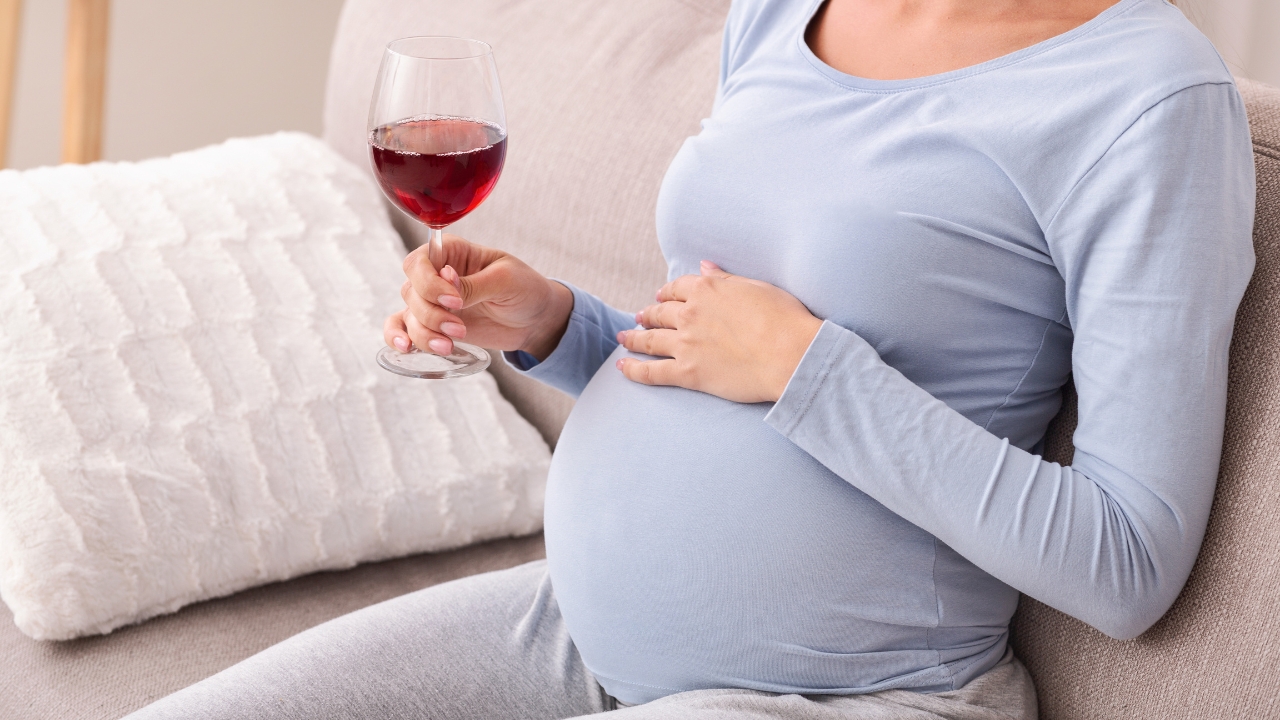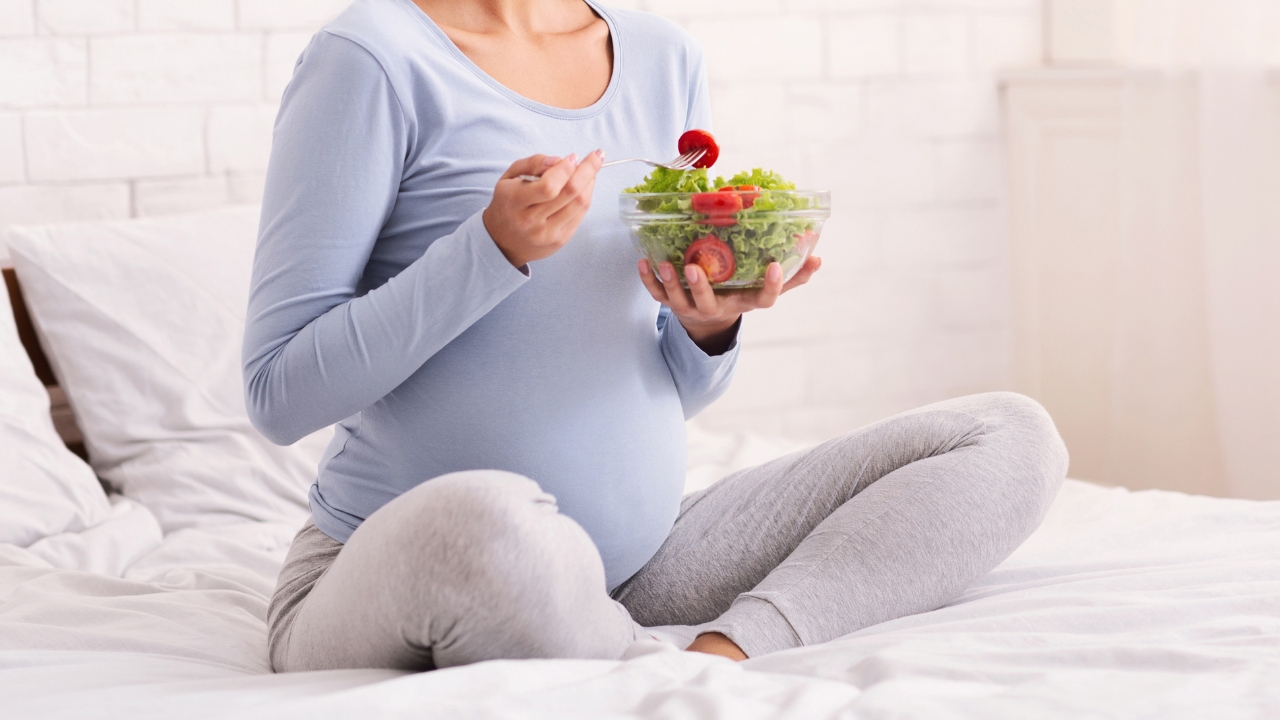 Evidence Based
Evidence Based
Drinking Red Wine During Pregnancy: Benefits, Risks & Research

Red wine during pregnancy may be unsafe for maternal/fetal health. Photo: Oleksandr Nagaiets/shutterstock
A survey of pregnant people found that many found the current alcohol restrictions patronizing and felt that there wasn’t enough evidence to restrict red wine during pregnancy. All survey participants reported low-level alcohol intake during pregnancy was acceptable, even though avoidance was safest. Findings of another study revealed that the public health message to pregnant people about alcohol contained little information about the harmful effects on the fetus and was not very motivating.
This is an apparent public health problem since 13.5% of pregnant people reported consuming alcohol in the past 30 days, and 5.2% reported binge drinking. The health effects of alcohol on the developing fetus are known as fetal alcohol syndrome disorder or FASD, affecting 1%-5% of children globally, with exact rates unknown.
Alcohol is on the list of foods to avoid during pregnancy as there is no safe level of consumption established.
Can You Drink Wine While Pregnant?
- A significant portion of pregnant people regard low intake of alcohol during pregnancy as acceptable.
- Alcohol, including red wine, should be avoided since there is no evidence of a safe level of intake, and current research on adverse effects on maternal/fetal health is overwhelming.
- Alcohol consumption during pregnancy may cause preterm birth, stillbirth, miscarriage, low birth weight, sudden infant death syndrome, fetal alcohol syndrome, and fetal alcohol syndrome disorder.
- Alcohol’s potential to cause adverse effects in pregnancy is multifactorial depending on the stage of gestation, genetics, amount consumed, type of alcohol, and hydration state, among others.
Is Drinking Red Wine During Pregnancy Safe?

According to a 2023 narrative review, the consequences of low to moderate alcohol consumption on the neurodevelopmental growth of the fetus remain unresolved. This type of research confuses the public by providing misleading information. For example, it does not consider the 2022 animal study that showed just one exposure to alcohol during a critical developmental phase of fetal growth interrupted cord blood supply, which may affect neurodevelopmental growth and impact cranial volume.
A possible reason for claiming unresolved evidence is nutritional modifiers. One study found that maternal intake of calories, iron, and choline was protective against fetal exposure to prenatal alcohol intake. Other reasons affecting the prenatal impact of alcohol include the gestational stage of alcohol exposure, volumes of alcohol consumed, environmental factors, stressors, and heredity.
Using any amount of alcohol during pregnancy is associated with preterm birth, stillbirth, miscarriage, low birth weight, and sudden infant death syndrome. For the infant, it may mean a lifelong struggle with behavioral issues, physical disabilities, and intellectual deficits.
According to Gerald DiLeo, MD, OB/GYN and author of The Anxious Parent’s Guide to Pregnancy, “A healthy liver can detoxify a certain amount of alcohol per hour, even in pregnancy. Problems with exposure depend on volume, type of alcohol (even red wine), the trimester of pregnancy, and even a pregnant mother’s state of hydration. While the body can be forgiving of those who drank on rare occasions before they knew they were pregnant, the one truism that should always apply is the following: There has never been established any SAFE MINIMUM amount of alcohol that can be consumed during pregnancy without exposure to the developing baby. Thus, if you’re pregnant, don’t drink.”
Is one glass of red wine worth risking the health of your birth experience or your baby’s lifelong future?
Red Wine During Pregnancy Benefits
Despite the high risk of drinking alcohol during pregnancy, the risk for FASD, and poor prenatal outcomes, there are a couple of benefits. This by no means makes it okay to drink. Not all babies are affected by alcohol, but is it worth risking the chance that yours might be one of them?
Hypertensive Disorders
The development of high blood pressure and even preeclampsia are common problems during pregnancy, affecting one in seven to twelve pregnancies. Surprisingly, maternal intake of alcohol was found to be negatively related to the development of high blood pressure and preeclampsia in pregnant people. The study concluded that despite these positive findings, given the fetal toxicity associated with alcohol, recommendations for avoidance during pregnancy remain.
Stress Reduction
Pregnancy is an incredibly stressful time for many people. Doctors and midwives have been known to recommend the occasional glass of wine to soothe stress in harried parents-to-be. However, reducing your stress can be done in many other ways without endangering your or your baby’s health.
Meditation, walks in nature, soothing background music, yoga, restful sleep, and calming social interactions can help reduce jangled nerves and heightened sensitivity to environmental stimuli. Rather than turning to the occasional glass of wine, you can use alternative stress-reducing lifestyle modifications.
Risks of Drinking Wine While Pregnant
So, what does the research say about the risks of alcohol or red wine consumption on pregnancy outcomes or the developmental growth of the fetus?
Alcohol Can Harm The Fetus
Alcohol can readily pass from the mom’s circulation directly to the fetal placenta and amniotic fluid. It is a known teratogen and neurotoxin. Once in the amniotic fluid, the fetus can continually ingest it if it remains in circulation.
Alcohol exposure is a known risk factor for stillbirth, intrauterine growth retardation, low birth weight, and spontaneous abortions. Prenatal alcohol exposure is evident in decreased overall brain size, which can be observed immediately upon birth and then again later in life. In addition, it affects protein metabolism, gene regulation and expression, endocrine function, prostaglandin synthesis, increased cellular death in brain structures, and increased oxidative stress neurologically.
Fetal Alcohol Syndrome Disorder
Fetal alcohol syndrome, or FAS, and fetal alcohol syndrome disorder, or FASD, exceed 1% prevalence in 76 countries, while many states in the U.S. report a prevalence of up to 5%, with many cases undiagnosed.
It is the most severe form of FASD, where there are central nervous system problems, facial deformities, and growth pattern abnormalities with coexisting learning, memory, attention span, communication, vision, or hearing problems.
Fetal alcohol syndrome disorder consists of four different symptom sets: FAS, alcohol-related neurodevelopmental disorder, alcohol-related birth defects, and neurobehavioral disorder associated with prenatal alcohol exposure. The lifetime cost of one child with FASD is approximately one million dollars.
There are no blood tests for FASD. Rather, clinicians look for prenatal alcohol exposure in any amount, as well as central nervous system signs such as a small head circumference or hyperactivity, smaller than expected height or weight, and a smooth ridge between the nose and upper lip.
Those with FASD may not be diagnosed until later in childhood and face a lifelong struggle with behavior, memory, attention, and learning.
Poor Birth Outcomes
We have already mentioned the relationship between prenatal alcohol exposure and miscarriage, spontaneous abortion, and stillbirth. Alcohol is also detrimental to cardiovascular and liver health in general.
For example, a systematic review and meta-analysis of the literature on low to moderate alcohol intake found a direct correlation between the dosage of alcohol and the incidence of miscarriages. Each additional drink per week was associated with a 13% increase in the risk of a miscarriage.
In another study, over 49% of pregnant people admitted to alcohol consumption during early pregnancy. The percentage of these drinkers who miscarried was 12% or 25% of those who admitted to drinking. Each successive week of alcohol use between weeks five through ten from the last menstrual period was associated with an 8% increase in spontaneous abortions.
Stillbirths were reported for 26% of those who reported drinking a low amount of alcohol continuously throughout pregnancy, a statistically significant number of those surveyed. So, for those who say there is no evidence for adverse outcomes of low intakes of alcohol, here is one right here.
Tips For Avoiding Alcohol
Here are some action-oriented tips for avoiding alcohol while pregnant.
- If you know you have a problem with alcohol before pregnancy or when you find out you are pregnant, seek professional help immediately to cope with your substance abuse.
- If you are considering getting pregnant, now is the time to start quitting.
- Learn and practice behavioral modification techniques to quit drinking if it has become a habit. Engage the help of a counselor if needed. For example, learn to identify your drinking triggers and avoid them, challenge the way you think about drinking, identify and develop strategies for social situation triggers, and develop coping strategies for why you drink.
- Clean your home out of all alcohol.
- Avoid places or situations that trigger you to drink.
- Verbalize your decision not to drink to family, co-workers, and friends. Engage their support.
- List positive rewards for choosing not to drink.
- Practice relaxation techniques.
- Make a list of acceptable alcohol alternatives, like seltzer water, and have them available in your home.
- Think of alternative activities to do that don’t involve drinking. Make a list.
Conclusion
Disregarding the well-meaning intentions of those who may advise you to enjoy an occasional glass of wine while pregnant is the wisest course of action. Drinking any alcohol at all during pregnancy poses a risk to fetal development and birth outcomes. While there is inadequate research on safe levels of alcohol to drink while pregnant, a plethora of evidence, both current and historical, exists that any alcohol at all may have adverse outcomes for you and your baby.
Despite the publication of some recent research stating unresolved evidence regarding low-level alcohol consumption in pregnancy, there is evidence of adverse effects of low-level consumption of alcohol during pregnancy in both animal and human studies. Such unresolved conclusions are misleading to the public and other health professionals.
However, it remains clear that drinking alcohol during pregnancy remains a public health problem with broad social acceptance, particularly where health care is scarce. It is also evident that more comprehensive and motivating health messages need to be given about the effects of alcohol on the developing fetus. In addition, clinicians should provide structured intervention and support to those struggling with binge drinking and substance abuse for improved compliance with and understanding of professional guidelines.
Please contact your healthcare provider if you have any questions about this topic.
Frequently Asked Questions
No, research indicates that any amount of alcohol may cause health problems for the fetus that may not be diagnosed until later in childhood.
Spontaneous abortion, stillbirths, and miscarriages may occur.
Resources
MANA adheres to strict sourcing guidelines, avoids most tertiary sources, and uses only professional resources updated to contain accurate and current information. We majorly rely on peer-reviewed studies, academic research from reputable medical associations. For more information regarding our editorial process, please refer to the provided resources.
- Katalin Ujhelyi Gomez, Goodwin, L., Chisholm, A. and Rose, A.K. (2022). Alcohol use during pregnancy and motherhood: Attitudes and experiences of pregnant women, mothers, and healthcare professionals. PloS one, [online] 17(12), pp.e0275609–e0275609. doi:https://doi.org/10.1371/journal.pone.0275609.
- Crawford-Williams, F., Steen, M., Esterman, A., Fielder, A. and Mikocka-Walus, A. (2015). ‘My midwife said that having a glass of red wine was actually better for the baby’: a focus group study of women and their partner’s knowledge and experiences relating to alcohol consumption in pregnancy. BMC pregnancy and childbirth, [online] 15(1). doi:https://doi.org/10.1186/s12884-015-0506-3.
- Gosdin, L.K., Deputy, N.P., Kim, S.Y., Dang, E.P. and Denny, C.H. (2022). Alcohol Consumption and Binge Drinking During Pregnancy Among Adults Aged 18–49 Years — United States, 2018–2020. Morbidity and mortality weekly report, [online] 71(1), pp.10–13. doi:https://doi.org/10.15585/mmwr.mm7101a2.
- G Bandoli (2023). Low to Moderate Prenatal Alcohol Exposure and Neurodevelopmental Outcomes: A Narrative Review and Methodological Considerations. Alcohol research, [online] 43(1). doi:https://doi.org/10.35946/arcr.v43.1.01.
- R Colin Carter, Marjanne Senekal, Duggan, C.P., Dodge, N.C., Meintjes, E.M., Molteno, C.D., Jacobson, J.L. and Jacobson, S.W. (2022). Gestational weight gain and dietary energy, iron, and choline intake predict severity of fetal alcohol growth restriction in a prospective birth cohort. The American journal of clinical nutrition, [online] 116(2), pp.460–469. doi:https://doi.org/10.1093/ajcn/nqac101.
- CDC (2024). About Alcohol Use During Pregnancy. [online] Alcohol and Pregnancy. Available at: https://www.cdc.gov/alcohol-pregnancy/about/index.html [Accessed 26 Jun. 2024].
- CDC (2024). High Blood Pressure During Pregnancy. [online] High Blood Pressure. Available at: https://www.cdc.gov/high-blood-pressure/about/high-blood-pressure-during-pregnancy.html [Accessed 26 Jun. 2024].
- Martin, F.Z., Fraser, A. and Zuccolo, L. (2022). Alcohol Intake and Hypertensive Disorders of Pregnancy: A Negative Control Analysis in the ALSPAC Cohort. Journal of the American Heart Association. Cardiovascular and cerebrovascular disease, [online] 11(19). doi:https://doi.org/10.1161/jaha.121.025102.
- NHS Choices (2024). Drinking alcohol while pregnant. [online] Available at: https://www.nhs.uk/pregnancy/keeping-well/drinking-alcohol-while-pregnant/ [Accessed 26 Jun. 2024].
- Popova, S., Danijela Dozet, Shield, K., Rehm, J. and Burd, L. (2021). Alcohol’s Impact on the Fetus. Nutrients, [online] 13(10), pp.3452–3452. doi:https://doi.org/10.3390/nu13103452.
- Popova, S., Danijela Dozet, Shield, K., Rehm, J. and Burd, L. (2021). Alcohol’s Impact on the Fetus. Nutrients, [online] 13(10), pp.3452–3452. doi:https://doi.org/10.3390/nu13103452.
- CDC (2024). About Fetal Alcohol Spectrum Disorders (FASDs). [online] Fetal Alcohol Spectrum Disorders. Available at: https://www.cdc.gov/fasd/about/index.html [Accessed 26 Jun. 2024].
- Lange, S., Probst, C., Gerrit Gmel, Rehm, J., Burd, L. and Popova, S. (2017). Global Prevalence of Fetal Alcohol Spectrum Disorder Among Children and Youth. JAMA pediatrics, [online] 171(10), pp.948–948. doi:https://doi.org/10.1001/jamapediatrics.2017.1919.
- Nih.gov. (2024). Fetal Alcohol Spectrum Disorders | National Institute on Alcohol Abuse and Alcoholism (NIAAA). [online] Available at: https://www.niaaa.nih.gov/research/fetal-alcohol-spectrum-disorders [Accessed 26 Jun. 2024].
- Sundermann, A.C., Zhao, S., Young, C.L., Lam, L., Jones, S.H., Velez, D.R. and Hartmann, K.E. (2019). Alcohol Use in Pregnancy and Miscarriage: A Systematic Review and Meta‐Analysis. Alcoholism/Alcoholism, clinical and experimental research, [online] 43(8), pp.1606–1616. doi:https://doi.org/10.1111/acer.14124.
- Sundermann, A.C., Velez, D.R., Slaughter, J.C., Wu, P., Jones, S.H., Torstenson, E.S. and Hartmann, K.E. (2021). Week-by-week alcohol consumption in early pregnancy and spontaneous abortion risk: a prospective cohort study. American journal of obstetrics and gynecology, [online] 224(1), pp.97.e1–97.e16. doi:https://doi.org/10.1016/j.ajog.2020.07.012.
- Hein Odendaal, Dukes, K.A., Elliott, A.J., Willinger, M., Sullivan, L.M., Tripp, T., Coen Groenewald, Myers, M.M., Fifer, W.P., Jyoti Angal, Boyd, T.K., Burd, L., Cotton, J.B., Folkerth, R.D., Hankins, G., Haynes, R.L., Hoffman, H.J., Jacobs, P.K., Petersen, J. and Pini, N. (2021). Association of Prenatal Exposure to Maternal Drinking and Smoking With the Risk of Stillbirth. JAMA network open, [online] 4(8), pp.e2121726–e2121726. doi:https://doi.org/10.1001/jamanetworkopen.2021.21726.





